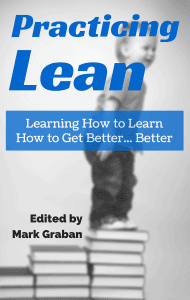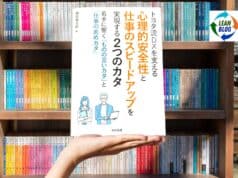 As I'm documenting in the comments here, the collaborative eBook Practicing Lean has now generated more than $1000 in donations to the Louise Batz Patient Safety Foundation. Thanks to everybody who has bought the book so far!
As I'm documenting in the comments here, the collaborative eBook Practicing Lean has now generated more than $1000 in donations to the Louise Batz Patient Safety Foundation. Thanks to everybody who has bought the book so far!
I thought I was calling the book “done,” but the beauty of self-publishing and electronic publishing is that I could add a new chapter, a submission I received from Lesa Nichols, a former Toyota employee. She's now a consultant who teaches Toyota Production System principles.
Her chapter is about some of her early education that she received at Toyota. An excerpt is below.
I hope you'll buy the e-book through:
- LeanPub.com (choose your own price, minimum $2.99)
- Amazon Kindle Store ($4.99)
If you bought the book previously, you should have received the new version with this chapter. If you have read the book, please consider leaving a review on Amazon.
A paperback version will be available soon, as well as an audiobook format. Again, all proceeds are being donated to a great cause, the Louise Batz Patient Safety Foundation.
 By Lesa Nichols:
By Lesa Nichols:
I heard a quote early on in my career with Toyota that goes something like this:
“Within 3 days, people think they can talk about Standardized Work,
Within 3 months, people think they can teach Standardized Work,
Within 3 years, people realize they know nothing about Standardized Work”
This has certainly been my personal experience.
Just like any journey to acquire a skill, there are the high highs and the low lows. Graduating from high school, I thought I had conquered the world and the path ahead in college would be more of the same. Until I realized that I was a lowly freshman. Stunned at how quickly I realized how little I actually knew, it was hard to keep the shock factor in check. But I did. It became a lot easier with the recognition that everyone around me was having a similar experience. This pattern has continued throughout my career.
…
All I could see in my early days of my experience with Standardized Work was a bunch of documents. Capacity sheet, Combination Table, Chart, Time observation sheet, blah, blah, blah. For me, they were merely something you had to get through to work with the more glamorous tools of the Toyota Production System (TPS) i.e. jidoka, continuous flow, and kanban. Of course, I wasn't able to see how one concept fit to another and why Standardized Work always came first.
While I was with the Toyota Supplier Support Center (TSSC), I was part of a small team assigned to improve the productivity of a work cell. It took about 10 minutes of observation to feel a high level of frustration from operators, and yet we proceeded to document the current condition standardized work. I felt I was wasting time working on paper and couldn't see how standardized work analysis could possibly help the operators have a less frustrating day.
My mentor, who was leading the improvement strategy at this plant, saw that I, along with the rest of the team, had become too caught up in details of how to do time studies and fill in the documents. He called a halt. He explained, “You are not seeing the true condition. You are lost in the documents.”
What coaching did Lesa receive? What happened next? To read more, please buy the book Practicing Lean using the links above.
What do you think of the quote Lesa shared from Toyota?
What do you think it means to be “lost in the documents?”
What sort of coaching or mentoring do you predict she received?
What are your thoughts about using the word “standardized,” as Toyota does, instead of “standard work?”
Here is a blog post I wrote about this in 2008:
“Standard” vs. “Standardized” Work in Lean
And I wrote this in 2010:
My Thoughts on Standardized Work
Thanks to Lesa for her contribution and reflections!
Great #Lean lesson from Lesa Nichols from her time at Toyota. Read more: https://t.co/4QfTkSQyBc pic.twitter.com/U3UBqg53o6
— Mark Graban (@MarkGraban) January 30, 2017
… as shared on Twitter as an image… feel free to share.
What do you think? Please scroll down (or click) to post a comment. Or please share the post with your thoughts on LinkedIn – and follow me or connect with me there.
Did you like this post? Make sure you don't miss a post or podcast — Subscribe to get notified about posts via email daily or weekly.
Check out my latest book, The Mistakes That Make Us: Cultivating a Culture of Learning and Innovation:









